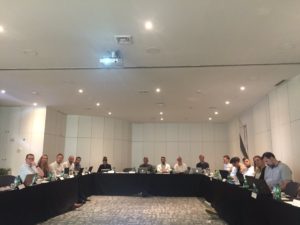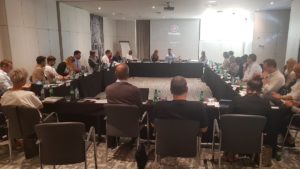Jul 3, 2018
In the framework of the European Commission funded project “European Social Dialogue targeted initiative: strengthening social dialogue in the professional basketball sector”, the meeting brought together eight female basketball players, active or retired. Players from EU Athletes’ members SNB (France), AJUB (Spain) and GIBA (Italy) as well as from Belgium and Turkey participated in the meeting.
One of the main goals of the project is to support organizing in European basketball, helping establish new player unions as well as assisting the existing ones in developing and building their capacities. Specific focus on women’s basketball and gender activity was added in order to take into account specific issues faced by women athletes at work, as demonstrated by EU Athlete’s SWAFE project. The meeting was an opportunity for the participants to bring forward their concerns covering topics such as worker’s status and social security, late or non-payment of wages, maternity, dual career and need for the development of women’s game.
“Talking with players from all around Europe, we are aware that their working conditions can vary greatly from one country to another. That’s why the European social dialogue is a perfect tool to work together with the employers to make sure that common minimum requirements are defined and respected. This project gives us an opportunity to further develop the representation in the sector and undertake further initiatives for the benefit of players and the sport of basketball“ said Paulina Tomczyk, EU Athletes General Secretary, who participated in the meeting.

The project is coordinated by UNI Europa/World Players Association, with EU Athletes involved as associated partner, and will run for 18 months, until June 2019. Activities of the project are being developed in the cooperation with UBE and will include further meetings with players from Germany, Turkey and other European countries.
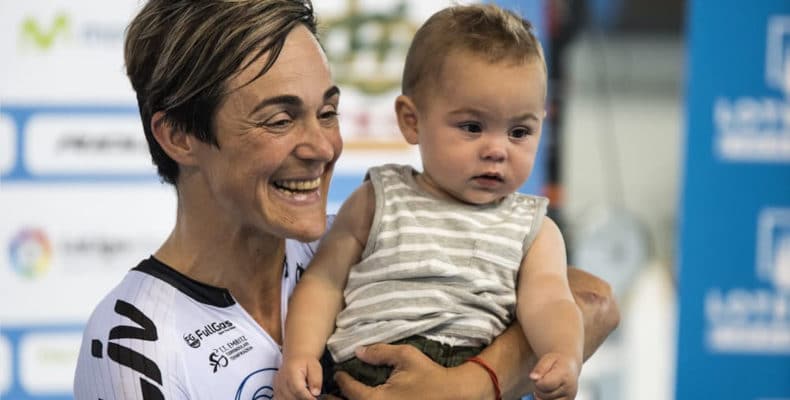
Jul 2, 2018
EU Athletes supports the case of Spanish cyclist Leire Olaberría, which raises important questions about the gender equality in sport, women’s rights for family and personal life and more generally, about the rights of women as athletes and as women in society. The article from The Cyclists’ Alliance:
Multi-time Spanish champion and 2008 Olympic medalist, Leire Olaberría, has challenged the alleged discrimination against her by the Spanish national cycling federation (RFEC). She has filed a complaint with Spain’s highest sporting authority, the National Sports Council, as well as an ethics complaint to the UCI, regarding her maternity rights. One of The Cyclists’ Alliance’s fundamental objectives is to uphold the rights of every woman to have a family and pursue a racing career, and we wholeheartedly support Olaberría’s actions.
Olaberría recently became a mother for the first time, and just four months after recovering from childbirth, she resumed training and competing at the elite level. However, the RFEC placed special conditions on her participation in the national track cycling program training camp, including paying the costs for travel and care of her baby, and the costs for her partner or a nanny to help with the baby’s needs. She was selected for the European Championships at the camp, but the RFEC again demanded that she pay all costs for her baby and a caregiver to travel to the Berlin event, but since she did not have enough money in reserve, she had to decline her spot on the team.
When Olaberría spoke up against these demands, the national team stated that she was in violation of team behavior and disregarded the superior authority of her team manager. Olaberría was eventually excluded from the national team altogether, despite the absence of any documentation of this alleged behavior, nor any record of a disciplinary action by the team against her. Since then, Olaberría has demonstrated that she is still among the world’s top track racers by earning a significant amount of UCI points in other international events, while competing with the help of a small team she organized around her.
The Association for Women in Professional Sport (AMDP), an organization for the advancement of all Spanish women in sport (including athletes, trainers and technicians, coaches, and journalists), has brought her case forward under the umbrella of Spain’s Equal Rights law, which also has specific provisions for the rights of women in sport. Specifically, the AMDP is asserting that the actions of the Spanish Federation are damaging Olaberría’s sporting career due to its discriminatory treatment of her. When Olaberría was asked to compete for the national team, it was because of her excellent results; but when she asked for provisions to accommodate her baby (which is her right under Spanish law), the team allegedly began to treat her unfairly.
Olaberría’s case is just beginning, but fundamentally it is about the rights of women as athletes and as women in society. The Cyclists’ Alliance will work with our partners in athlete rights, including EU Athletes and the World Players Association, to help factually and lawfully present Olaberría’s case to the appropriate sporting bodies if possible. We have already made strides with the UCI to introduce better treatment, and the Alliance will continue to press for maternity rights as a fundamental standard condition in our contracts with our teams at every level, and in every discipline, of our sport.
Motherhood should not restrict your choices and trajectory as a professional cyclist. Having a child may be a defining moment in your life, but it is not the end of your sporting career. Many women racing today have started families, and some, like former world champion Lizzie Deignan, have made their intentions clear that motherhood will make them stronger and even more determined competitors in the future.
If you have questions about your maternity rights as a cyclist and as a working professional in sport, please don’t hesitate to contact a board member of the Alliance today. We can help you to find your country’s labor and discrimination laws, and to help you understand your rights to build a family while also building a successful bicycle racing career.
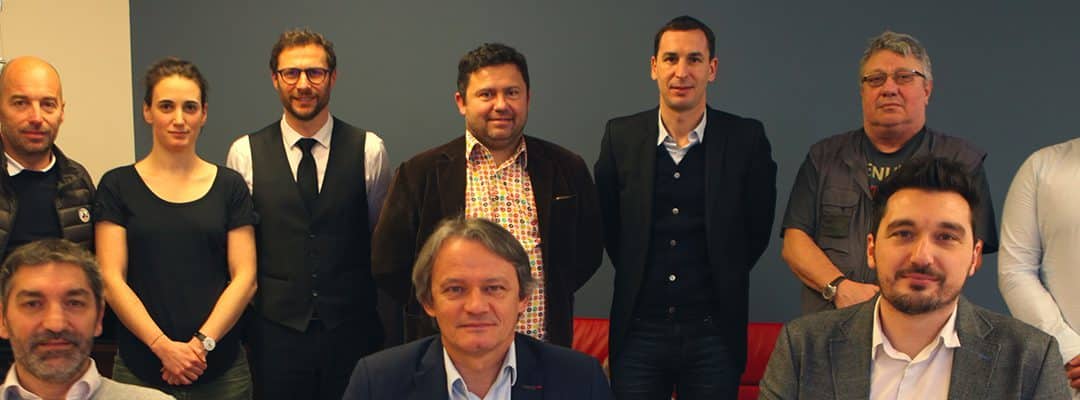
Jun 29, 2018
EU Athletes supports FNASS (Fédération nationale des associations et syndicats de sportifs) and our French affiliates UNFP (football), SNB (basketball), PROVALE (rugby) and AJPH (handball), protesting the changes in the law which extends the duration of the first professional contract for athletes.
By introducing the amendment in the law on vocational training (formation professionnelle) which affects the sport law, the deputes supported by the Sport Minister’s cabinet, have responded to wishes of sport organizations’ officials (especially those in football) who wants to keep the young players in their clubs as long as possible. It could effectively restrict player’s right to work and prevent them from developing their professional careers.
As FNASS points out, there are no other reasons for this change except for financial ones. It puts all the players in the same category, without taking into account the specificities present in different sports. Even if football is being targeted, the harmful effects will touch all the sports represented in FNASS as well as the other ones.
Sylvain Kastendeuch, the President of FNASS, outraged by the amendment, asks: “How can we act as if the social dialogue didn’t exist, without listening to the voice of athletes and their representatives, who have clearly expressed their refusal to change the duration of the first professional contract from 3 to 5 years? How can we forget the EU Directive 99/70 on fix-term work who gives the right to define fix-term contacts to social partners?”
FNASS demands the withdrawal of the amendment, which wouldn’t have improved the conditions of training of athletes in France or their status. It would only allow certain entities to make more gains, with a breach of athletes’ commercial freedom and without thinking about their future.
Paulina Tomczyk, the General Secretary of EU Athletes, added: “We stand by our French members and athletes, who protest both the content of the amendment and the process in which it was introduced. It is not acceptable that the rights of professional athletes are restricted just because they work in sport. Social dialogue is an essential component of good governance and the competence of social partners in defining employment issues in sport must be respected.”
To find out more visit FNASS website www.fnass.fr and follow them on Twitter @FNASS_
Jun 21, 2018
UNI Global Union World Women’s Conference and World Congress has taken place in Liverpool 14-20th of June 2018 and brought together almost 2 000 delegates from all around the World. Being affiliated to UNI Global Union as well as its regional organization UNI Europa and the sport sector World Players Organization, EU Athletes is a part of a federation of 20 million service workers from more than 150 countries. It was an opportunity to define priorities and strategy for the years to come, to recognize the progess and the exceptional achievements but also a moment of important changes in the leadership.
Ruben Cortina, the President of UNI Americas was unanimously voted in as the new president of UNI Global Union, replacing Ann Selin who has been President of UNI Global Union for four years. Christy Hoffman has been elected as the new General Secretary, taking over from Philip Jennings, who led UNI Global Union for 18 years. Patricia Nyman was elected as President of UNI Women, following the retirement of Denise McGuire who was steering it for a decade.
EU Athletes General Secretary Paulina Tomczyk had an opportunity to share the challenges and the important work that the organization is doing in the field of women’s sport and gender equality with the World Women’s Conference.
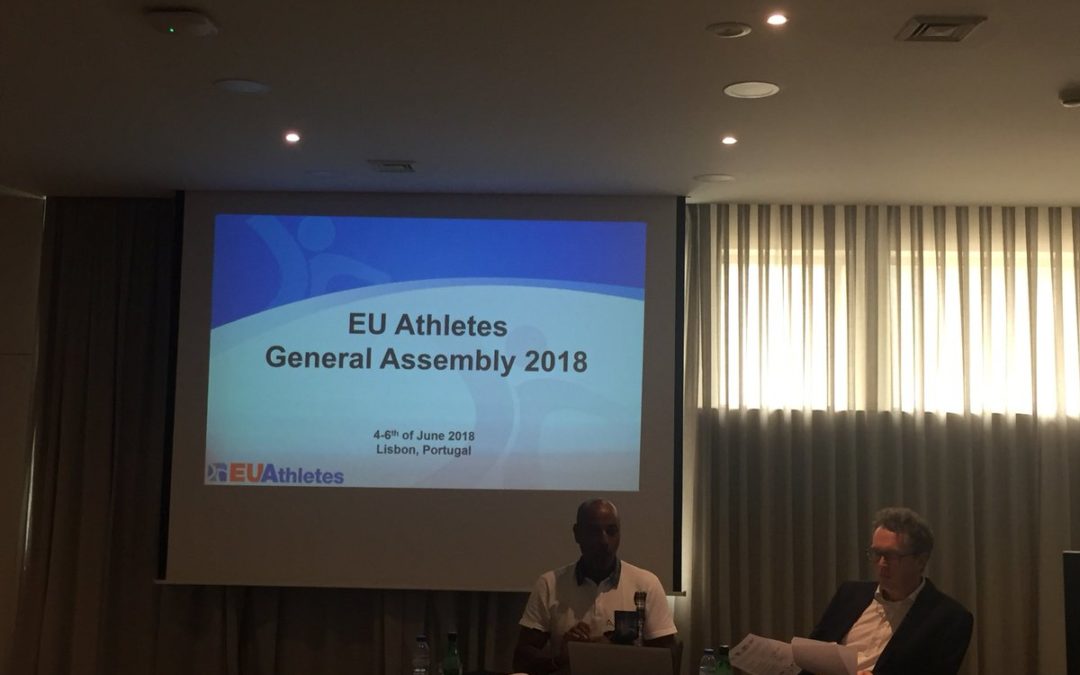
Jun 11, 2018
EU Athletes held its annual General Assembly in Lisbon, Portugal on 4-6th of June 2018, with over 25 member player unions and athlete associations represented. This was the first Assembly after the changes in EU Athletes leadership, with Brendon Batson as President and Paulina Tomczyk as General Secretary.
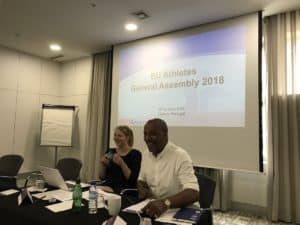
This year’s Assembly focused on mental health and gender equality – two areas where the player unions play the leading role and have been behind initiatives, campaigns and every-day work that improve the situation of athletes significantly. Further part of the meeting included revision of the Common Position Paper, future Erasmus+ projects and update latest activities, including the importance of ISU case for athletes around Europe.
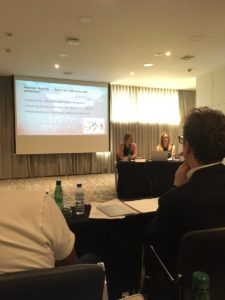
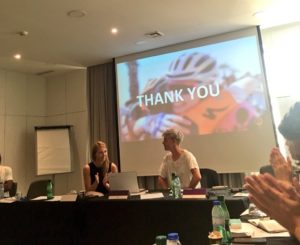
Following the elections, Alessandro Marzoli (GIBA) has been reelected for another term as Executive Board member, alongside Sander van der Holst (NL Sporter) and Jeff Reymond (PROVALE), former General Secretary of EU Athletes.
